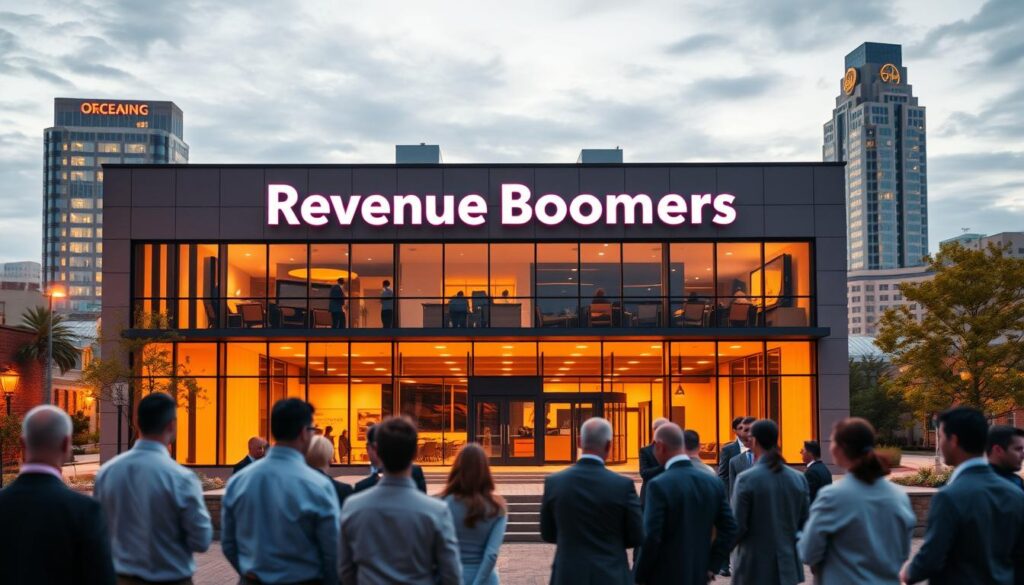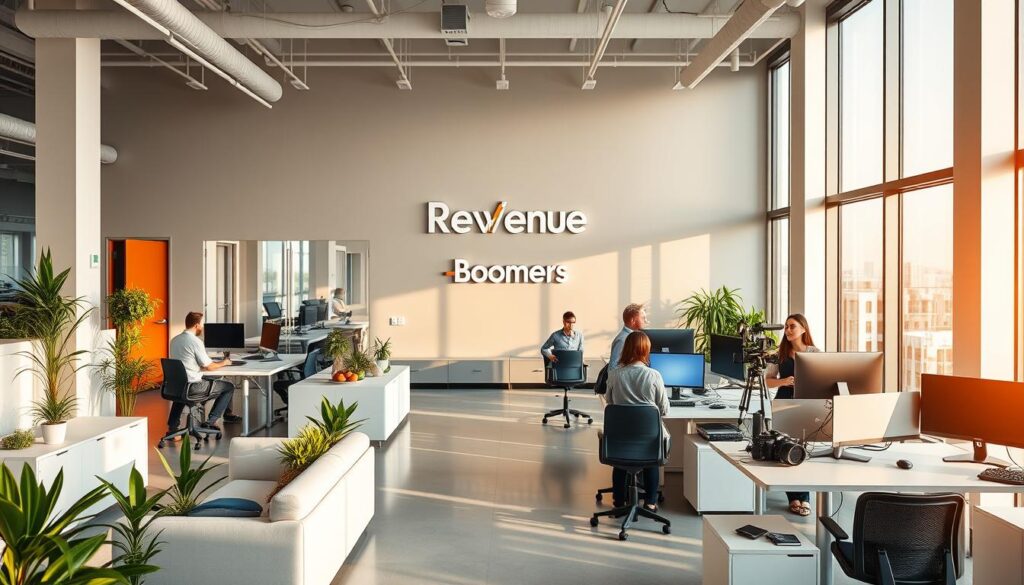Looking ahead, we all wonder: What’s the future of SEO in 2030? The world of Search Engine Optimization is changing fast. This is due to new tech and how people use the internet. We’ll show you the SEO trends 2030 and how businesses can keep up. This includes voice search, visual search, and the need for trustworthy content.
By 2030, Google will focus more on content from trusted sources. This is to make searches better and meet our needs. With voice search set to be over 50% of searches, it’s crucial to adjust your SEO plans. Let’s dive into the key changes that will shape SEO’s future, helping your business stay on top.
Key Takeaways
- Voice search is predicted to dominate search queries by 2030.
- Visual search technologies are expected to become mainstream.
- Local SEO will gain paramount importance in digital marketing strategies.
- SEO strategies will increasingly prioritize content demonstrating expertise and trustworthiness.
- AI and machine learning are set to automate crucial SEO tasks.
Introduction to SEO Evolution
The SEO evolution story is about how simple tactics turned into complex digital marketing plans. These plans aim to improve how users interact with websites. Google’s advanced algorithms have driven this change, pushing companies to use more detailed strategies.
Big updates like Panda, Penguin, and Hummingbird have changed the game. They focus on making content that users find valuable and engaging. This means companies should create content that meets search engine standards and also adds real value to users.
Now, local SEO is getting more attention due to people searching online for local services. The COVID-19 pandemic has made online presence even more important for businesses. Being seen online is key to standing out in a crowded market.
User experience (UX) is now a key factor in SEO. Websites that are easy to use, load quickly, and work well on mobile devices rank higher. With video and voice search becoming more popular, businesses need to keep up with these changes.
| Factor | Impact on SEO |
|---|---|
| User-Centric Content | Enhances engagement and satisfaction, boosting site rankings. |
| Local SEO | Essential for attracting local customers and improving visibility. |
| Mobile Optimization | Critical for accommodating the growing number of mobile users. |
| Video Content | Increasingly favored by search engines as it drives user engagement. |
| Voice Search | Requires adaptation to conversational queries for effective targeting. |
Artificial intelligence is becoming more important in SEO. Making websites that offer a great user experience will be crucial. Keeping up with changes in digital marketing strategies helps businesses stay ahead in the SEO world.
What is the Future of SEO in 2030?
SEO is set to change a lot by 2030. New tech and changing user needs mean old ways won’t work anymore. The focus will be on understanding what users really want and need.
Understanding the Shift Away from Traditional Approaches
Traditional SEO methods will fade away. Quantum computing will change search algorithms, giving fast, accurate results. Neuro-SEO uses science to get into user’s minds, leading to better engagement and happiness.
The Role of User Intent in Future SEO Strategies
SEO in 2030 will all about user intent. AI will help adapt to new user behaviors. This will make sure the right content reaches the right people.
- Personalized Data Ownership SEO will let users control their data, building trust and better experiences.
- Multimodal Search Optimization will mix different data types for a more complete search experience, boosting engagement.
- Sustainable SEO will favor websites that are good for the planet, showing a shift towards eco-friendly choices.
Contextual Layering will make search results better for complex questions. This means users will find content that really meets their needs. With more people not clicking on links, making content that answers questions directly is key.

| SEO Trend | Description |
|---|---|
| Neuro-SEO | Uses science to understand what users want, making content more engaging. |
| AI-Driven Schema Evolution | Changes schema markup based on user behavior and trends. |
| Multimodal Search Optimization | Uses different data types for better search results. |
| Sustainable SEO | Focuses on eco-friendly content, meeting consumer demand for green choices. |
| Behavioral Economics SEO | Uses psychology to influence how users interact with content. |
In summary, SEO’s future will be all about understanding users and using new tech to connect with them. Businesses that adapt will stay ahead in the digital world.
AI and Machine Learning: The Future Backbone of SEO
Digital marketing is changing fast, and AI in SEO 2030 will be key. It will help businesses understand what users want better. This means search results will be more personal and useful.
Machine learning will make these systems smarter over time. They’ll learn from how users interact with them. This means they’ll get better at helping users find what they need.
How AI Enhances User Experience
AI systems will look at more than just what users type. They’ll also consider emotions and context. This helps make search results more accurate and relevant.
For example, AI can make ads more personal. This can boost sales by up to 10%. Chatbots, powered by AI, offer quick customer support. This makes users happier and more likely to come back.
As the AI market grows, so will the focus on using AI to connect brands with users better.
Automating SEO Tasks with Machine Learning
Machine learning will make SEO tasks easier. It will free up time for more important work. AI can predict search trends, helping marketers stay ahead.
These tools also make search results more precise. This is good for users and helps businesses stay competitive. As machine learning in SEO grows, it will be crucial for success online.
Voice Search Optimization in 2030
Voice search is becoming a big deal online. In the U.S., 40% of internet users use voice assistants every month. This shows a big move towards talking to tech instead of typing.
Businesses need to make their content easy to talk to, not just read. This way, they can reach more people and keep their customers interested.
The Rise of Conversational Queries
People are now searching in a more natural way. They want to talk to tech like they talk to friends. This means using longer, more detailed phrases in searches.
About 22% of voice searches are about local stuff. So, businesses should make sure their content answers local questions well.
Strategies for Adapting to Voice Search Trends
To keep up with voice search, businesses need smart plans. Here are some ideas:
- Focus on long-tail keywords: Use phrases that sound like real speech.
- Utilize schema markup: This helps search engines understand your content better.
- Create concise content: Answer questions quickly and clearly.
- Optimize for mobile: Most voice searches happen on phones, so make sure your site works well on them.
- Monitor voice search analytics: Look at data to see what users want and improve your content.

The future of voice search looks bright for businesses. Those who get it right will reach more people and stay ahead in their markets.
| Statistic | Percentage/Value |
|---|---|
| Monthly engagement with voice assistants | 40% |
| Consumers using voice search for local information | 58% |
| Total number of voice assistants in use | 4.2 billion |
| Monthly voice searches conducted | 1 billion |
| Smart speaker shopping revenue forecast | $40 billion |
| Voice search queries related to local content | 22% |
Mobile-First Indexing in 2030
Technology is advancing fast, making mobile-first indexing even more important by 2030. Websites need to work well on all smart devices. People use their phones for everything from searching to shopping.
This means websites must be easy to use on phones. They should load quickly and be simple to navigate.
The Importance of Mobile Optimization
Without good mobile optimization, businesses might lose customers. Important parts of mobile optimization include:
- Responsive design that fits different screens
- Fast-loading images and content
- Easy navigation that keeps users engaged
- Local info and clear calls-to-action
Mobile sites that work well improve user experience and search rankings. As mobile-first indexing becomes more common, companies that don’t adapt will fall behind.
Impact on Local SEO Strategies
Mobile optimization changes local SEO strategies. With more mobile searches, businesses need to focus on local online presence. Key effects include:
- Better visibility in local searches.
- Current and accurate business listings everywhere.
- More engagement with local promotions.
- Better user experience and higher conversion rates.
Using augmented reality in local SEO can also boost user interaction. Brands might use AR to show products in real-time. As social media adds AR, local SEO’s role will grow, pushing businesses to keep up.
| Strategy | Impact on SEO |
|---|---|
| Mobile-Friendly Design | Improves user engagement and lowers bounce rates |
| Local Listings | Enhances visibility in local search results |
| Real-Time Analysis | Allows for rapid adaptation to user behavior |
| Augmented Reality Features | Increases user interaction and immersion |
By 2030, businesses must focus on mobile optimization for local SEO. Quick adaptation to these changes is key to staying visible and engaging online.
Enhanced User Experience (UX) and Core Web Vitals
The world of UX and SEO is changing fast. Now, we focus more on making user experiences better. Google’s Core Web Vitals help us measure how well websites load, interact, and look. This way, SEO experts can make sure websites not only get visitors but also keep them engaged.
Key Metrics for User Experience in 2030
In 2030, a few key metrics will show if a website is user-friendly:
- Loading Performance: Websites need to load quickly to keep users interested.
- Interactivity: Making websites more responsive helps users stay engaged.
- Visual Stability: Keeping the layout stable makes browsing smoother for users.
By focusing on these areas, businesses can meet user needs and search engine standards. Regular technical SEO audits help keep up with these standards. This way, any problems can be found and fixed quickly.
Technical SEO Audits for Improving UX
Regular technical SEO audits will become key for better UX. These audits check if websites meet Core Web Vitals standards. They look at site structure, load times, and mobile use. This ensures a complete online presence improvement.

| Metric | Importance | Impact on Rankings |
|---|---|---|
| Loading Performance | Key to user retention | Direct correlation with lower bounce rates |
| Interactivity | Essential for user engagement | Influences dwell time |
| Visual Stability | Reduces user frustration | Affects overall user satisfaction scores |
SEO Trends 2030: Visual and Video Search
Digital search is changing fast, and businesses need to keep up. By 2030, visual and video content will be key in SEO. It’s crucial to know how to use these in your digital plans to succeed.
Integrating Video SEO into Your Strategy
Video SEO is key for better search visibility. Search engines love engaging visual content. So, make sure your video titles, descriptions, and transcriptions are optimized.
Good video production and content that matches user interests are vital. This will help you stand out in the digital world.
Optimizing for Visual Search Technologies
Using visual search technologies is now a must for online marketing. With tools like Google Lens, your images need to be search-friendly. Use descriptive alt tags, high-quality images, and SEO-friendly file names.
These steps boost engagement and search rankings. Knowing how people use images online is also important.
For more on adapting to these changes, check out SEO trends 2030 insights.
Local SEO’s Growing Importance
The digital world is expanding fast, making local SEO more vital than ever. By 2030, companies that use smart local SEO will shine in a crowded market. Key to this success is having accurate business listings, positive reviews, and consistent NAP (Name, Address, Phone) info.
These details greatly affect how well a business shows up in local searches. For businesses aiming to be seen by local customers, adapting to these elements is essential.
Strategies for Local Search Optimization
Companies should focus on making their sites mobile-friendly. With more people searching on mobiles, this is crucial for local marketing. Creating content that talks directly to the local community can boost engagement and trust.
Also, using business directories and keeping information up-to-date can improve search rankings. This helps businesses show up better in local searches.
Factors Influencing Local Search Results
Several important factors shape local search results. Relevant keywords, a good user experience, and quality backlinks are key. Social signals, like reviews on Google My Business and Yelp, also play a big role.
As competition grows, businesses that focus on these factors will thrive by 2030. They’ll be better prepared for the changing digital world.






